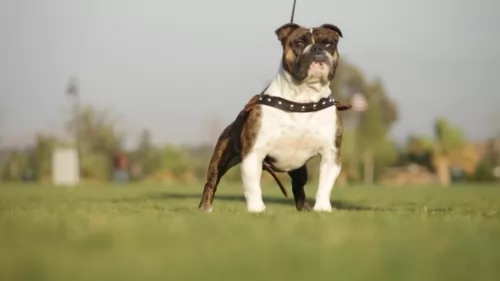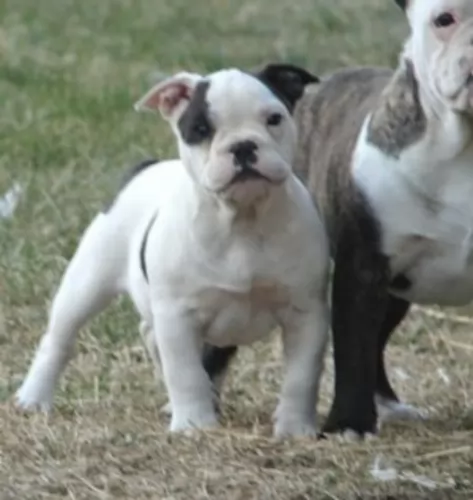 Petzlover
PetzloverBoth Bantam Bulldog and Tweed Water Spaniel are originated from United Kingdom. Bantam Bulldog may grow 24 cm / 9 inches shorter than Tweed Water Spaniel. Bantam Bulldog may weigh 12 kg / 26 pounds lesser than Tweed Water Spaniel. Both Bantam Bulldog and Tweed Water Spaniel has almost same life span. Both Bantam Bulldog and Tweed Water Spaniel has same litter size. Bantam Bulldog requires Low Maintenance. But Tweed Water Spaniel requires Moderate Maintenance
 The origin of the Bantam Bulldog goes back to the 1800s, and in fact there is evidence of miniature bull dogs in 1899, In 1902 the smaller bulldog breed was facing extinction, so that it became necessary to import French bulldogs to England to help restore the bantam bulldog breed.
The origin of the Bantam Bulldog goes back to the 1800s, and in fact there is evidence of miniature bull dogs in 1899, In 1902 the smaller bulldog breed was facing extinction, so that it became necessary to import French bulldogs to England to help restore the bantam bulldog breed.
It was only in 2002 that the United Canine Association recognized the English bantam bulldog.
They’re the same as the ordinary bulldog except they are lighter and shorter, although there are slightly larger ones which are as tall as a regular bulldog.
The Bantam bulldogge is related to the English and French bulldogs so that the standards for the bantam breed has similarities to both types.
The Tweed Water Spaniel is extinct. Fortunately, we have some beautiful dogs that come from this dog. It is involved in bringing about the Golden Retriever. They were athletic dogs from Berwick-upon-Tweed.
It was in 1816 that Richard Lawrence wrote of the origins of the Tweed Water Spaniel which is thought to have come from the Newfoundland dog. It is believed that huntsmen used these dogs to retrieve the ducks and geese they shot. This purebred dog wasn’t recognized by the American Kennel Club or the FCI.
 The breed has its origins with the English bulldog, but it was in 2011 that the ‘English’ was abandoned and the name of the dog changed to Bantam Bulldogge. Short to medium in height, and with his large, square head and broad, short muzzle, the dog is short, strong, stout and compact. He had wide apart eyes, short, half-pricked, half-floppy ears and the front legs are also strong and set wide apart.
The breed has its origins with the English bulldog, but it was in 2011 that the ‘English’ was abandoned and the name of the dog changed to Bantam Bulldogge. Short to medium in height, and with his large, square head and broad, short muzzle, the dog is short, strong, stout and compact. He had wide apart eyes, short, half-pricked, half-floppy ears and the front legs are also strong and set wide apart.
He is fit and active with a playful, jovial personality. The Bantam Bulldog is completely at ease with his human family and welcomes visitors to the home. He forms strong bonds with everyone in the family and loves the presence of children in the home too. As with most other dog breeds, he does well with training and socialization – it just makes him a better dog all round. He doesn’t have a problem with accepting other pets in the home.
The coat of the Bantam is short, dense and straight with the skin being tight to the body but looser around the head and neck. Both head and face have moderate wrinkles. The coat is available in all colors and is low maintenance. A good brush twice a week won’t only remove loose hairs and keep his short coat glossy, the mere act of brushing him strengthens the bond between you as well.
The Tweed Water Spaniel had a curly liver-colored coat with a long feathery tail and medium-sized floppy ears. It is thought that he was a large dog standing at between 50 to 60cm in height and weighing between 25 and 32kg.
The Tweed Water Spaniel, regarded as a moderate shedder, would have required being brushed from time to time.
The Tweed Water Spaniel had so many wonderful characteristics that made him a splendid family pet. He was smart and able to learn basic commands. He was also very playful and would have made a robust, playful friend for children.
They made gentle, loyal companions for their human family and wee able to get on well with other pets in the home. They would have got on well with other pets in the home too and it is believed that they were amicable enough to have been suited as a therapy dog.
They made good watchdogs too, being active and alert, just loving the outdoors. They’re well suited to life in the country or a home with a big garden and wouldn’t like to be cooped up on a small property in the city.
 The Bantam Bulldog is full of personality and is active, friendly and social. He is an adaptable pet and will happily live with his human family in an apartment or in a home with a garden. Patient and tolerant, he responds well to the voice of his owner and simple commands are no problem with him as he is quick to learn and to please.
The Bantam Bulldog is full of personality and is active, friendly and social. He is an adaptable pet and will happily live with his human family in an apartment or in a home with a garden. Patient and tolerant, he responds well to the voice of his owner and simple commands are no problem with him as he is quick to learn and to please.
He is never going to be much of a guard dog for you, but he will be a happy, contented, loyal and devoted companion who just wants to be as close to you as he can.
Intelligent, courageous and friendly, it seems such a pity that the Tweed Water Spaniel is extinct because he seemed to have been a super dog.
Luckily we have dogs such as the Golden Retriever that remind us of what a good family pet he was.
 A happy dog is a healthy dog, but the happy Bantam Bulldog will be prone to certain ailments that are common to his breed
A happy dog is a healthy dog, but the happy Bantam Bulldog will be prone to certain ailments that are common to his breed
This breed of dog is prone to have hip dysplasia. Because of their genetic make-up, the soft tissues surrounding the joint develop abnormally and the disease can affect one- or both hips.
Bulldogs can also be prone to digestion issues which amounts to flatulence. This problem however, can be reduced significantly by giving your pet the best diet. Speak to your vet about appropriate foods for dogs with a sensitive stomach. With a sensitive stomach, you want to avoid dog foods with toxic colorants, artificial preservatives and artificial flavors.
Be aware of breathing problems with your bantam bulldog because flat-faced dog breeds such as this can battle with upper airway problems. Symptoms of an obstructed upper airway can include noisy breathing, panting, snoring, rapid breathing and coughing.
Because this dog is extinct and because no health records were kept, it is assumed that he would have had the same health issues as a Golden Retriever. Typical health issues of this dog would include hip dysplasia, obesity, cardiomyopathy.
This is a preventable disease in dogs, and if dog owners only knew what damage they do by allowing their dogs to become obese. Certainly, obesity shortens a dog’s life.
It is mind-boggling to realize that scientific evidence tells us that fat tissue is biologically active, secreting inflammatory hormones and also putting stress on the dog’s joints. Obese dogs develop an increased risk for cancer, diabetes and heart disease.
Dilated cardiomyopathy is a disease of the heart muscle characterized by an enlarged heart. The heart doesn’t function properly with the ventricles becoming enlarged. The muscle wall of the heart becomes thinner and this causes the heart to lose the ability to pump blood to the rest of the body.
Fluid can accumulate in the lungs. This can all lead to congestive heart failure. Your dog will battle to breathe, be panting and coughing, have an extended abdomen and may even collapse.
 Your Bantam Bulldog needs a lot of protein in his diet. In fact, the Association of American Feed Control Officials have suggested that the dog needs at least 22% of maintenance protein for puppies and 18% of protein for adult dogs. Speak to your vet about wet- and dry dog foods and which foods will suit this particular pet of yours. Always ensure cool, fresh water is within your pet’s reach.
Your Bantam Bulldog needs a lot of protein in his diet. In fact, the Association of American Feed Control Officials have suggested that the dog needs at least 22% of maintenance protein for puppies and 18% of protein for adult dogs. Speak to your vet about wet- and dry dog foods and which foods will suit this particular pet of yours. Always ensure cool, fresh water is within your pet’s reach.
The exercise needs of the Bantam Bulldog are minimal. He is never going to turn down a game of ball with the kids but you don’t have to take him on long walks or runs. He is a social pet, so even though you don’t have to be putting him through an exercise program every day, he doesn’t want to be left alone hour after hour, day after day.
The Tweed Water Spaniel had floppy ears and as a water dog, he may well have had ear infections in his day. One wonders if dog owners of that time were aware of the need to have the inside of the dog's ears clean and dry.
The Tweed Water Spaniel would have needed to have his eyes checked too. Pus in the eyes could indicate the dog wasn’t well.
The Tweed Water Spaniel would have required a lot of exercise and would have loved long walks and hikes. He wouldn’t need an invitation to go swimming and if you threw a stick or ball into the water, he’d be right there, jumping right in.
If you were a person that thrived on an active life this dog would have been for you.
Nobody really knows what the Tweed Water Spaniel would have eaten in the 19th century when he was around. He’s the kind of dog you’d have to be careful with as he could put on weight easily.
If he were around today, you’d give him a high quality commercially manufactured food that was designed for large, active dogs. No doubt in those days, the owners gave the dog scraps off the table.
Today if you wanted to give your dog home-made food, you’d stick to healthy foods such as boiled chicken, brown rice or pasta and some healthy vegetables such as spinach, carrots and sweet potatoes.
Puppies would have required 4 bowls of food a day while the adult dog would require 2 meals a day.